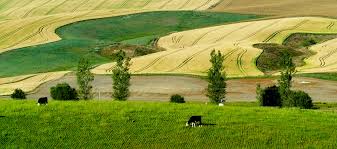Kansas is known as the wheat state because of its grain production. However, wheat is an excellent grazing crop, so producers may want to look at income from forage as well as the grain. Depending on weather and market conditions, producers can consider three basic wheat grain and forage strategies: harvest the wheat as grain only, as forage and grain, or as forage only (graze out).
Many Kansas producers view wheat grazing as an opportunity for additional revenue that presents itself periodically in certain locations in Kansas, depending on planting and growing conditions. If the objective of the wheat crop is to harvest both forage and grain, cattle must be removed before the wheat reaches the jointing stage to minimize grain yield losses. Grazing typically begins in mid-October to mid-November, depending on planting date and moisture. Cattle are supplemented through the winter when the wheat is dormant or snow covered. Under proper management research shows little or no effect on yields with properly managed spring grazing. Additional fertilizer will be required after spring grazing to achieve desired yields. Be aware that grain yields can be reduced significantly by excessive stocking rates, or by leaving the cattle on too long in the spring. The stocking rate needs to be increased in the spring relative to that of fall and winter to assure uniform grazing and for- age utilization During lush growth, cattle are susceptible to bloat, so management of this risk is important. Including an ionophore with supplemental feed or by other means can improve daily gains and reduce bloat.
There are a number of alternative arrangements for wheat pasture leasing: 1) dollar per hundredweight per month; 2) dollar per pound of gain; 3) dollar per head per day; or 4) dollar per acre. Some leases may dictate the amount and type of supplemental feed to be provided. Producers who graze their own cattle on their own wheat should consider the lease charge as an opportunity cost of their forage, as they could lease it to someone else.





